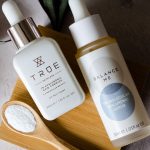“Are Anti Aging Collagen Sheet Masks Suitable for All Skin Types?” is a collaborative post.
Skin is a complex organ with diverse characteristics that vary dramatically from person to person. Imagine your skin as a unique landscape, with its own terrain, moisture levels, and sensitivity. Dermatologists categorize skin into five primary types: normal, oily, dry, combination, and sensitive. Each type responds differently to skincare products, making it essential to understand your specific skin profile before introducing any new treatment like anti aging collagen sheet masks. Normal skin typically appears balanced, with minimal oil and few imperfections. Oily skin produces excess sebum, leading to a shiny appearance and potential breakouts. Dry skin feels tight, might appear flaky, and often lacks natural moisture. Combination skin presents a mix of characteristics, usually with an oily T-zone and drier cheeks. Sensitive skin tends to react quickly to environmental triggers, becoming red, itchy, or inflamed with minimal provocation.
What are Anti Aging Collagen Sheet Masks?
Collagen sheet masks represent a revolutionary skincare technology designed to deliver concentrated nutrition directly to the skin’s surface. These innovative masks are typically crafted from soft, thin materials like cotton, bio-cellulose, or hydrogel, saturated with a potent serum rich in collagen peptides and complementary ingredients. The primary purpose of these masks is to combat visible signs of aging by improving skin elasticity, hydration, and overall texture. Collagen, a protein naturally produced by our bodies, provides structural support to skin cells, helping maintain firmness and preventing sagging. As we age, natural collagen production decreases, leading to wrinkles and loss of skin resilience. Anti aging collagen sheet masks aim to replenish this essential protein through a concentrated, targeted delivery method. The mask’s design allows for maximum absorption, creating a protective barrier that locks in moisture and active ingredients for enhanced effectiveness.
Compatibility with Oily Skin
Individuals with oily skin often approach skincare treatments with understandable caution, fearing products might exacerbate existing concerns like acne and excessive shine. Anti aging collagen sheet masks can actually be beneficial for oily skin types when selected strategically. The key lies in choosing masks formulated with non-comedogenic ingredients that won’t clog pores. Look for lightweight, water-based serums containing ingredients like hyaluronic acid, which provides hydration without adding extra oil. Some collagen masks incorporate mattifying components such as niacinamide or zinc, which help control sebum production while delivering anti-aging benefits. Oily skin types should opt for masks with a thin, breathable material that doesn’t feel heavy or suffocating. Frequency matters too – using these masks once or twice weekly can help balance skin without overwhelming oil glands. Professional dermatologists recommend patch testing new products and observing how your skin responds before full application.
Recommendations for Dry and Dehydrated Skin
Dry and dehydrated skin types can particularly benefit from anti aging collagen sheet masks, which offer intense moisture replenishment. These masks act like a hydration reservoir, infusing skin with essential nutrients and water-binding ingredients. Hyaluronic acid, a star component in many collagen masks, can hold up to 1000 times its weight in water, providing deep, long-lasting hydration. For individuals experiencing skin tightness, flakiness, or premature aging signs, these masks can be transformative. The occlusive nature of sheet masks creates a barrier that prevents moisture evaporation, allowing active ingredients to penetrate more effectively. Ceramides and glycerin often accompany collagen in these treatments, further supporting the skin’s protective barrier. People with dry skin should look for masks with rich, nourishing formulations that include natural oils and botanical extracts. Applying these masks after gentle exfoliation can enhance absorption and maximize potential anti-aging benefits.
Sensitive Skin Considerations
Sensitive skin requires meticulous selection of skincare products, and anti aging collagen sheet masks are no exception. Individuals with reactive skin must prioritize hypoallergenic, fragrance-free formulations that minimize potential irritation. Before full application, conducting a patch test on a small skin area can reveal potential adverse reactions. Seek masks containing soothing ingredients like aloe vera, chamomile, and panthenol, which calm inflammation and reduce redness. Avoid masks with alcohol, artificial fragrances, and harsh chemical preservatives that might trigger sensitivity. Some collagen masks specifically target sensitive skin, using minimal, gentle ingredients designed to strengthen the skin’s natural barrier. Consulting a dermatologist can provide personalized guidance on selecting the most suitable product. Generally, sensitive skin types should start with shorter mask application times and gradually increase duration as tolerance develops.
Combination Skin Adaptability
Combination skin presents unique challenges, requiring a nuanced approach to skincare treatments. Anti aging collagen sheet masks can be particularly effective for this skin type when chosen wisely. These masks can simultaneously address different skin zone needs – hydrating dry areas while managing oil production in the T-zone. Look for balanced formulations containing ingredients like niacinamide, which regulates sebum production, and hyaluronic acid, providing uniform hydration. Some masks offer targeted application techniques, allowing users to customize treatment based on specific skin area requirements. Dermatologists recommend rotating between different mask types to address changing skin conditions. For combination skin, using a lightweight, fast-absorbing collagen mask once or twice weekly can help maintain skin equilibrium while delivering anti-aging benefits.
Protective Strategies
Understanding potential allergic reactions is crucial when introducing anti aging collagen sheet masks into your skincare routine. Common allergens include botanical extracts, synthetic fragrances, and certain preservatives. Individuals with known sensitivities should carefully examine ingredient lists and conduct thorough patch tests. Watch for immediate signs of irritation like redness, itching, or burning sensations. Some people might experience delayed hypersensitivity reactions, developing symptoms hours or days after mask application. Consulting an allergist or dermatologist can help identify specific triggers. Consider masks with minimal, clean ingredient lists and those certified for sensitive skin. Natural, organic formulations often reduce the risk of adverse reactions. Keeping a detailed skin reaction journal can help track and understand individual sensitivities.
Expert Recommendations and User Experiences
Dermatological research consistently highlights the potential benefits of well-formulated anti aging collagen sheet masks across various skin types. Professionals emphasize the importance of individualized skincare approaches. User experiences suggest that success depends on product quality, individual skin chemistry, and proper application techniques. Many individuals report improved skin texture, increased hydration, and a temporary reduction in fine lines. However, experts caution against expecting miraculous, permanent transformations. Consistent, holistic skincare involving proper nutrition, hydration, sun protection, and lifestyle factors remains paramount.
Final Thoughts
- Understand your specific skin type before selecting a collagen sheet mask
- Choose masks with ingredients tailored to your skin’s unique needs
- Conduct patch tests to prevent potential allergic reactions
- Use masks as part of a comprehensive skincare routine
- Consult dermatologists for personalized skincare guidance
- Prioritize masks with clean, minimal ingredient lists
- Monitor your skin’s response and adjust usage accordingly







Comments are closed.